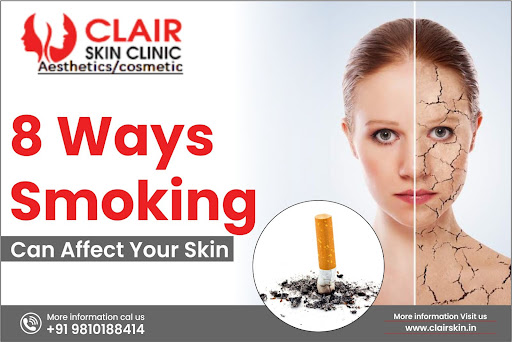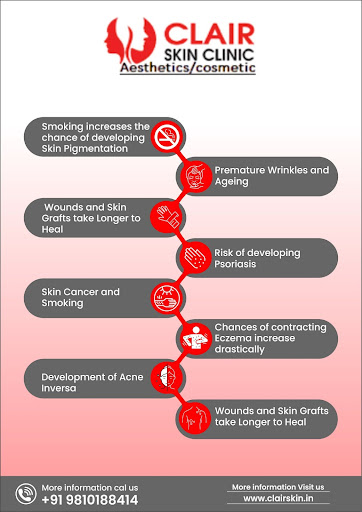
Smoking increases melanin in the skin, which could lead to skin pigmentation. Smoking has an enormous impact on your body’s biggest organ, the skin. Puffing on cigarettes puts your overall health at risk. Cigarette smoke comprises toxins that can cause premature ageing and other skin conditions.
Most people think that smoking adversely affects only the lungs and the heart. But apart from apparent links to cardiac disorders and lung cancer, smoking also causes skin damage. More you smoke cigarettes, the more likely you could develop wrinkles.
Nicotine in cigarette smoke decreases oxygen flow and supply of nutrients to the skin cells. Here are the top eight ways in which smoking cigarettes affect your skin.
Table of Contents
Feel free to skip ahead if one topic catches your eye
- Smoking increases the chance of developing Skin Pigmentation
- Premature Wrinkles and Ageing
- Wounds and Skin Grafts take Longer to Heal
- Risk of developing Psoriasis
- Skin becomes Sensitive to UV Rays
- Chances of contracting Eczema increase drastically
- Development of Acne Inversa
- Skin Cancer and Smoking
- Quit Smoking to improve your Skin Health
1. Smoking increases the chance of developing Skin Pigmentation
Cigarette smoking increases melanin in your skin, leading to the development of dark spots. These dark spots are primarily present on the face and other visible areas of your body. Nicotine gives rise to vascular constriction that restricts the free flow of blood.
It also constricts the blood vessels that make your body’s capillaries prone to damage. If you currently smoke and notice that your skin is suffering, consult your doctor at the earliest. In most cases, the best way to address tobacco-induced skin issues is to quit smoking.

2. Premature Wrinkles and Ageing
Lines and wrinkles can be pretty standard when you smoke. The toxins in cigarette smoke damage collagen and elastin. Collagen and elastin are the fibrous components of your skin that keep it firm and supple. Without elastin and collagen, the elasticity of your skin may get reduced. It leads to premature ageing and wrinkles. Wrinkles induced by tobacco smoke are most prominent on your face. Smoking cigarettes can also cause sagging of skin. It narrows the blood vessels and limits the oxygen supply to your skin. Nicotine also destroys vitamin-A in your skin, thereby causing premature ageing.
Also Read- How Does Smoking Cause Skin Darkening?
3. Wounds and Skin Grafts take Longer to Heal
Smoking causes delayed healing of wounds apart from lines and wrinkles. It leads to vascular constriction that impairs your body’s ability to circulate blood. It also makes it harder for you to heal from wounds.
Even minor scrapes and cuts in smokers might consume a significant amount of time to heal. Most doctors recommend their patients quit smoking before surgeries. This is because smoking inhibits the healing process of sutures and incisions. Ulcers may take a longer time to heal, and the risk of wound infection rises dramatically.
4. Risk of developing Psoriasis
Psoriasis refers to a chronic inflammatory skin condition that develops scaly and itchy patches. Nicotine can also develop scarring on the skin. If you have a darker skin tone, psoriasis may appear dark brown or violet with grey scales. In light skin tones, psoriasis appears pink or red with silvery scales.
Dermatologists opine that smoking is a significant risk factor for developing psoriasis. The primary factor behind developing psoriasis is nicotine present in cigarette smoke. Nicotine affects your immune system and causes skin inflammation. Smokers are also susceptible to contracting palmoplantar pustulosis. It is an inflammatory skin condition.
5. Skin becomes Sensitive to UV Rays
Smokers are more susceptible to develop sensitivity to UV rays than non-smokers. UV light can cause irreversible scarring on your skin if you’re a smoker. The sun-exposed parts of your body can develop pigmentation and a wide variety of skin disorders.
And when your skin is sensitive to UV rays, you’re more vulnerable to developing skin cancers. Exposure to UV rays dries out your skin and makes it scaly. The best way to decrease sensitivity to UV rays is to quit smoking.
Also Read- Top 10 Tips To Maintain Healthy And Glowing Skin
6. Chances of contracting Eczema increase drastically
Smokers are at an increased risk of contracting eczema. Eczema, also known as atopic dermatitis, can severely affect your overall appearance. Eczema develops as dry and itchy patches of skin. Even passive smokers are at a greater risk of developing atopic dermatitis.
Also, children exposed to secondary cigarette smoke are prone to develop eczema. Passive smokers also have a greater possibility of developing lines and wrinkles on their skin. If you are a passive smoker and noticing conditions like eczema, consult your dermatologist at the earliest.
7. Development of Acne Inversa
Acne Inversa, also known as Hidradenitis Suppurativa, is a common inflammatory skin disease in human beings. It is a condition where lesions develop in large areas of your body. In most cases, acne inversa is present in the intricate areas of your body like the underarms, groin, etc.
Acne Inversa is an inflammatory skin condition that requires proper treatment. Most often, doctors recommend you to stop smoking so that the condition heals faster. Current research studies indicate that toxins in cigarette smoke are the most significant risk factors for developing acne inversa.
8. Skin Cancer and Smoking
Cigarette smoke comprises a large number of carcinogens. As a result, if you smoke, you’re prone to develop squamous cell carcinoma. It is a type of skin cancer that can adversely affect your overall health. Squamous cell carcinoma looks like wart-like growths or open sores that can be painful.
Smokers are also at a greater risk of developing oral squamous cell carcinoma. Consult your doctor at the earliest if you notice the following symptoms:
- Pain in the wart-like growths
- White or red patch on the skin
- Steady weight loss
- Lump on the lip or the mouth
Also Read- Tips For Rejuvenating Your Skin While Staying At Home
Quit Smoking to improve your Skin Health
If you are coping with a skin issue related to smoking, it is advisable to quit tobacco. Quitting tobacco will help your overall body to recuperate faster. By decreasing smoking, you can reduce the inflammation of your blood vessels. In the absence of nicotine, your body’s blood circulation will improve. Skin discolouration will decrease once you quit smoking.
If you are suffering from skin pigmentation and other smoking-induced skin issues, Clair Skin Clinic can help. Located in Delhi, we are one of the leading skin care clinics. We use advanced skin care treatment procedures like Q-Switch Laser and Thread Lift to improve your skin’s overall appearance

